In the fast-growing world of pickleball, the referee’s role is often overlooked but is absolutely crucial. They’re not just there to call the shots; they’re the guardians of fairness, ensuring the game’s integrity is maintained. Think of them as the unsung heroes who keep the play smooth, fair, and fun for everyone involved.
Referees have a unique vantage point, standing at the helm of the game, they enforce rules, manage conflicts, and keep the game flowing. Their keen eye for detail and deep understanding of the game’s rules are what make pickleball matches not only competitive but also enjoyable. It’s a balancing act that requires a mix of authority and diplomacy, making their role both challenging and essential.
Importance of the Referee in Pickleball
The referee’s role in pickleball cannot be overstated. They’re not just on the court to enforce the rules, they’re pivotal in maintaining the spirit and integrity of the game. Without referees, the structure and flow of matches would suffer, leading to conflicts and confusion among players.
Referees possess a deep understanding of pickleball’s comprehensive rulebook. This includes everything from the intricacies of the serve to the subtleties of the no-volley zone, also known as the kitchen. Their expertise ensures that games are played fairly and within the boundaries of the established rules. By doing so, they uphold a level playing field for all participants, making competition just and enjoyable for everyone involved.
Moreover, referees play a crucial part in conflict resolution. Disputes over calls, scores, or rules are common in any competitive sport, and pickleball is no exception. Here, referees step in not just as rule enforcers but as mediators. Their objective judgment and ability to interpret the rules calmly and clearly help resolve conflicts, maintaining the game’s flow and minimizing disruptions.
Another key aspect of referees’ roles is overseeing the scoring. In pickleball, keeping track of points, serves, and side outs can become complicated. Referees ensure accuracy in scoring, which is fundamental for the integrity of the competition. Their vigilance helps prevent disputes related to scoring, allowing players to concentrate on their gameplay rather than keeping score.
Referees also contribute significantly to the safety of players. By enforcing rules such as the proper distancing of players in doubles, they minimize the risk of physical collisions and injuries. Their ability to anticipate play and position themselves strategically means they can swiftly intervene when safety rules are breached, ensuring that matches are not only fair but also safe for participants.
Their role extends to promoting sportsmanship among players. The presence of an authority figure on the court encourages players to conduct themselves with respect towards their opponents and the game itself. Referees recognize and commend good sportsmanship, contributing to a positive and respectful playing environment.
Key Responsibilities of a Pickleball Referee

Pickleball referees hold a unique position of authority on the court, tasked with a broad spectrum of responsibilities. These referees are essential for maintaining not only the flow of the game but also ensuring that all players adhere to the official rules. Their role is multifaceted, covering everything from the initial setup of the game to the final point scored, all while upholding the sportsmanship and integrity that the sport is known for.
Ensuring Fair Play
One of the primary responsibilities of a pickleball referee is to ensure that all players adhere to the rules, promoting fairness and equality in the game. This includes making calls on serves, faults, and line decisions. A referee’s judgment must be quick, accurate, and, most importantly, impartial to maintain the trust and respect of the players. They’re also tasked with monitoring the conduct of players, stepping in to mediate disputes and enforce penalties as needed. This ensures that the competition remains not only fair but enjoyable for everyone involved.
Overseeing Game Flow
Referees have a pivotal role in overseeing the flow of the game. They initiate play by calling the score and serve to ensure the game starts correctly. Throughout the match, they keep track of points, serving turns, and side changes, which is critical in games that can move as swiftly as pickleball. Their keen observation helps in identifying faults or any infractions that could disrupt the game’s rhythm. By managing these aspects efficiently, referees help maintain a steady pace, ensuring the game progresses smoothly without unnecessary delays.
Safety First
Safety is a top priority in any sport, and pickleball is no exception. Referees are entrusted with the responsibility of ensuring that the playing conditions are safe for everyone. This includes checking the equipment, such as paddles and balls, for regulation compliance and inspecting the court for any hazards that might pose a risk to the players. In the event of an injury or accident, the referee is often the first to respond, making quick decisions regarding play stoppage and seeking appropriate medical attention if needed.
The Referee’s Role in Enforcing Rules

Referees are the backbone of maintaining integrity and fairness in pickleball, a role that starts long before the first serve and extends throughout the entire match. They’re tasked with a comprehensive understanding of the rules, ensuring that each game flows smoothly and fairly. This deep knowledge allows them to oversee matches effectively, calling out violations and ensuring players abide by the guidelines set forth for the game.
At the heart of a referee’s responsibilities is the enforcement of rules. Whether it’s making judgment calls on close plays, such as determining if a ball was in or out, or keeping track of serves and the correct server position, referees have to be vigilant. Their decisions can dramatically affect the outcome of the game, making their role not just important but critical to the integrity of the match.
They start by checking proper court setup and equipment, ensuring balls and paddles meet official standards and that the net is at the right height. Once play commences, they are the arbiters of fairness, using their judgment and knowledge to call faults, line violations, and service errors. These calls can often be the source of disputes, and it’s in these moments that referees must stand firm, providing clarity and enforcing the rules without bias.
Key Responsibilities in Enforcing Rules
- Overseeing Serve Sequence: Referees keep track of the serving sequence, ensuring that players serve from the correct side and follow the two-bounce rule which states that each team must play their first shot off the bounce.
- Calling Faults: This includes foot faults, line violations, and non-volley zone infractions, among others. Referees must be attentive to call these infractions immediately and accurately.
- Monitoring the Non-volley Zone: Often referred to as the kitchen, ensuring players do not volley the ball from this area is crucial. Referees observe foot placement in relation to this zone closely.
Ensuring Player Compliance and Safety
Referees also play a significant role in ensuring player compliance with rules and safety regulations. They monitor player behavior and equipment, intervening when necessary to prevent unfair advantages or safety hazards. This may include:
- Equipment Checks: Confirming that all paddles and balls used in play comply with official pickleball standards.
- Conduct Violations: Addressing issues of sportsmanship and conduct, including penalizing unsportsmanlike behavior.
Managing Conflicts on the Pickleball Court

In the heat of competition, tensions can occasionally rise, leading to disagreements among players on the pickleball court. It’s in these moments that the role of the referee extends beyond just monitoring gameplay; they also become mediators. Their main objective is to ensure that conflicts are resolved swiftly and fairly, allowing the game to proceed without unnecessary interruptions.
Referees employ a variety of strategies to manage conflicts effectively. One of the first steps is to encourage open communication. They listen to the concerns of each player or team, ensuring that everyone feels heard. This approach often helps to diffuse tension and can lead to a quicker resolution. If the dispute is about a particular play or rule, the referee will consult the official rulebook. With a thorough understanding of pickleball regulations, they’re able to provide clarifications that can resolve misunderstandings or disputes.
In situations where players continue to disagree, referees might opt to make a binding decision based on their observation and understanding of the rules. This decisiveness is crucial in maintaining the flow of the game and upholding its integrity. However, they always aim to make such decisions with fairness and impartiality, explaining the reasoning behind their ruling to ensure that all parties understand the outcome.
Another key aspect of managing conflicts is preventing them from escalating. Referees are trained to recognize the early signs of disputes and intervene before they become more serious. This might involve giving gentle reminders about sportsmanship or, in some cases, implementing penalties for unsportsmanlike behavior. The goal is always to maintain a positive and respectful atmosphere on the court.
To further support their role in conflict resolution, referees often participate in ongoing training focused on communication and mediation skills. This preparation equips them to handle a range of situations with confidence and diplomacy. Whether it’s a simple misunderstanding or a more complex disagreement, referees are the linchpins in ensuring the game proceeds smoothly and enjoyably for everyone involved.
Their ability to manage conflicts effectively not only contributes to the fairness and integrity of the game but also enhances the overall experience for players and spectators alike. By fostering an environment of respect and understanding, referees play a pivotal role in maintaining the spirit and enjoyment of pickleball.
Balancing Authority and Diplomacy

Referees in pickleball play a crucial role, not just in enforcing the rules, but also in balancing their authority with diplomacy. It’s a delicate dance that involves being assertive enough to maintain control over the game, while also being approachable and fair in their interactions with players. This balance is essential for maintaining the spirit of the game and ensuring that matches proceed smoothly and enjoyably.
At the heart of this balance lies effective communication. Referees must be clear and concise when making calls, but they also need to listen to players’ concerns with an open mind. It’s not uncommon for situations to arise where players dispute a call or need further clarification of a rule. In these moments, the referee’s ability to calmly and clearly explain their decisions becomes paramount. They strive to ensure that their reasoning is understood, even if not all parties agree with the final call.
Another critical component is knowing when to assert authority and when to let the natural flow of the game take precedence. For instance, a referee might see a minor infraction that doesn’t impact play and choose to let it go to keep the game moving. However, if the infraction repeats or if a more serious rule is broken, they’ll step in decisively. This judgment call requires a deep understanding of the game, its rules, and the players involved, ensuring that the match is both fair and competitive.
Training also plays a significant role in equipping referees with the skills they need to balance authority and diplomacy. Ongoing education in rules, conflict resolution, and communication techniques empowers referees to handle the myriad situations they encounter on the court. Workshops and mentoring from experienced referees offer practical advice on navigating challenging scenarios, from heated disputes to managing spectators.
Equipped with these skills, referees are better able to foster a positive, respectful atmosphere during matches. They encourage sportsmanship and a spirit of fair play among competitors, intervening when necessary to prevent conflicts from escalating. Their role extends beyond mere rule enforcement to include being custodians of the game’s integrity and ambassadors of its values.
Conclusion
Referees in pickleball play a pivotal role that goes beyond just calling the shots. They’re the backbone of maintaining the sport’s integrity and ensuring that the spirit of competition thrives in a respectful atmosphere. It’s their adept balance of authority and approachability that keeps the game enjoyable for everyone involved. By embodying the values of the sport and promoting sportsmanship, referees not only enforce the rules but also enhance the pickleball experience. Their commitment to fairness and effective communication is what makes them indispensable on the court.

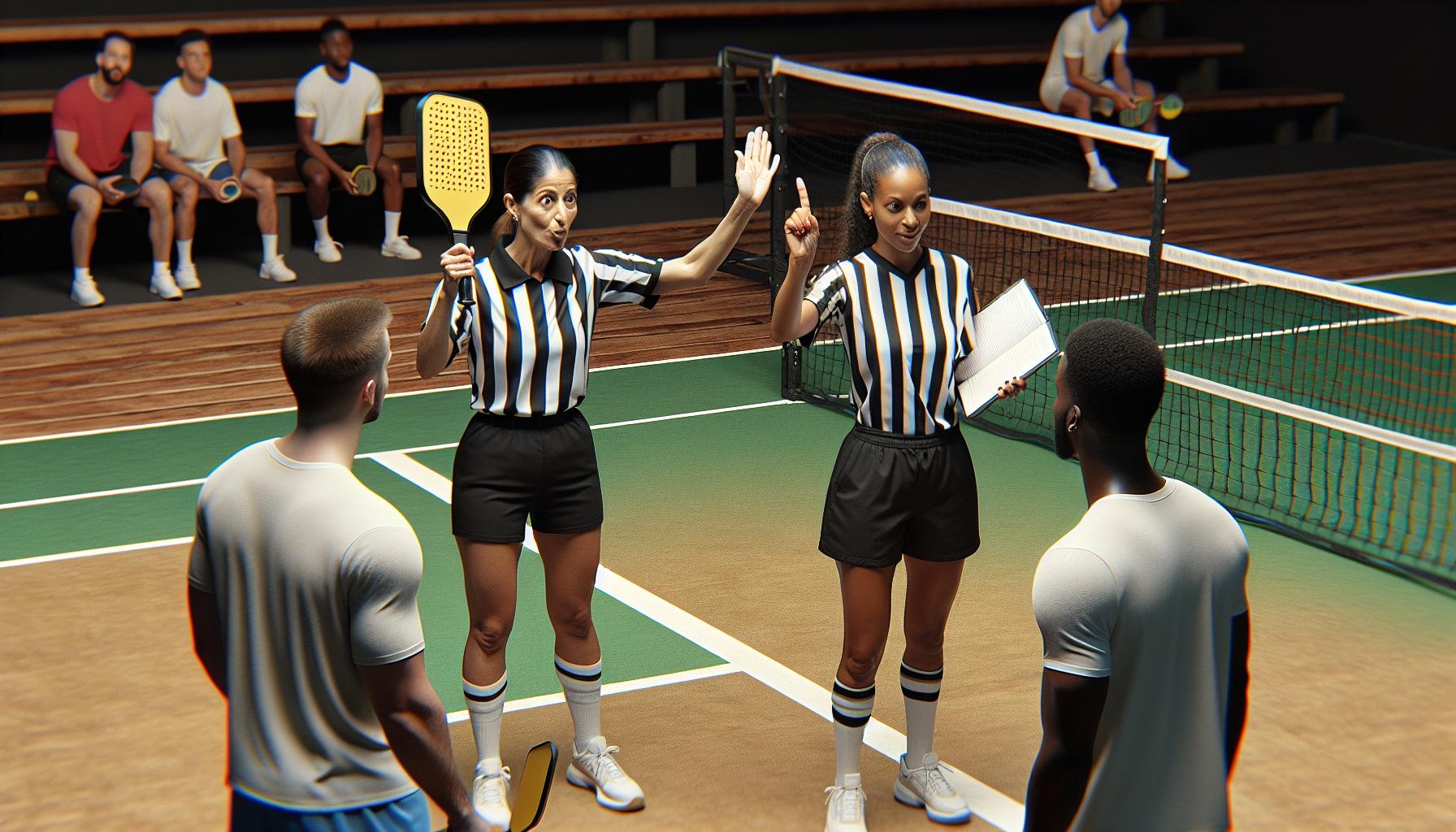






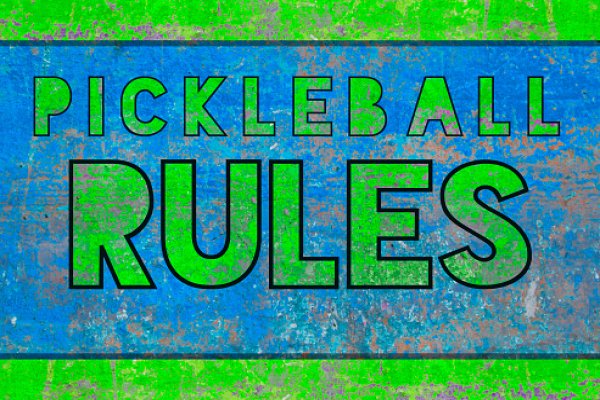
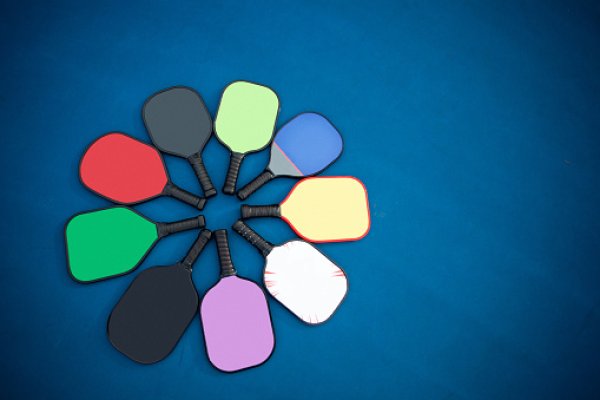
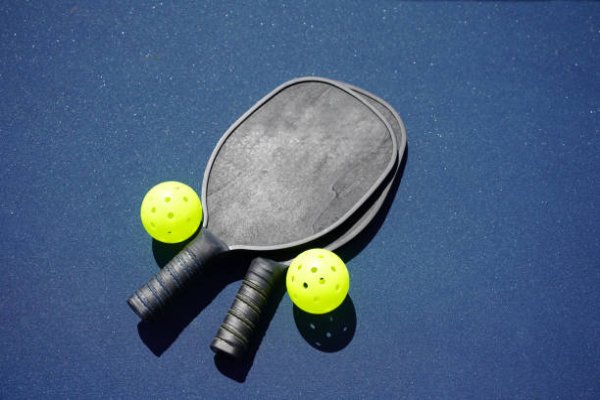


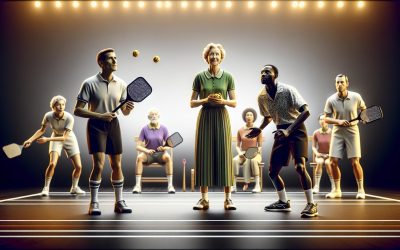
0 Comments